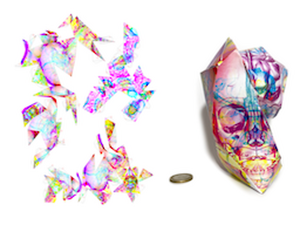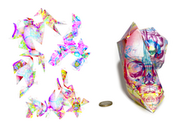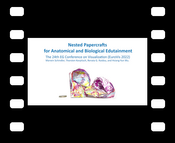Information
- Publication Type: Journal Paper with Conference Talk
- Workgroup(s)/Project(s):
- Date: June 2022
- Journal: Computer Graphics Forum
- Volume: 41,3
- Open Access: yes
- Location: Rom
- Lecturer: Hsiang-Yun Wu

- Event: EuroVis 2022 - 24th Eurographics Conference on Visualization
- DOI: 10.1111/cgf.14561
- Call for Papers: Call for Paper
- Booktitle: Eurographics Conference on Visualization (EuroVis) 2022
- Pages: 13
- Publisher: Wiley & Sons Ltd
- Conference date: 13. June 2022
– 17. June 2022
- Pages: 541 – 553
- Keywords: Applied computing, Life and medical sciences, Human-centered computing, Visualization techniques, Scientific visualization, Interaction paradigms
Abstract
In this paper, we present a new workflow for the computer-aided generation of physicalizations, addressing Nested configurations in anatomical and biological structures. Physicalizations are an important component of anatomical and biological education and edutainment. However, existing approaches have mainly revolved around creating data sculptures through digital fabrication. Only a few recent works proposed computer-aided pipelines for generating sculptures, such as papercrafts, with affordable and readily available materials. Papercraft generation remains a Challenging topic by itself. Yet, anatomical and biological applications pose additional Challenges, such as reconstruction complexity and insufficiency to account for multiple, Nested structures—often present in anatomical and biological structures. Our workflow comprises the following steps: (i) define the Nested configuration of the model and detect its levels, (ii) calculate the viewpoint that provides optimal, unobstructed views on inner levels, (iii) perform cuts on the outer levels to reveal the inner ones based on the viewpoint selection, (iv) estimate the stability of the cut papercraft to ensure a reliable outcome, (v) generate textures at each level, as a smart visibility mechanism that provides additional information on the inner structures, and (vi) unfold each textured mesh guaranteeing reconstruction. Our novel approach exploits the interactivity of Nested papercraft models for edutainment purposes.
Additional Files and Images
Additional images and videos
Additional files
Weblinks
BibTeX
@article{Schindler-2022-eurovis,
title = "Nested Papercrafts for Anatomical and Biological Edutainment",
author = "Marwin Schindler and Thorsten Korpitsch and Renata Raidou
and Hsiang-Yun Wu",
year = "2022",
abstract = "In this paper, we present a new workflow for the
computer-aided generation of physicalizations, addressing
Nested configurations in anatomical and biological
structures. Physicalizations are an important component of
anatomical and biological education and edutainment.
However, existing approaches have mainly revolved around
creating data sculptures through digital fabrication. Only a
few recent works proposed computer-aided pipelines for
generating sculptures, such as papercrafts, with affordable
and readily available materials. Papercraft generation
remains a Challenging topic by itself. Yet, anatomical and
biological applications pose additional Challenges, such as
reconstruction complexity and insufficiency to account for
multiple, Nested structures—often present in anatomical
and biological structures. Our workflow comprises the
following steps: (i) define the Nested configuration of the
model and detect its levels, (ii) calculate the viewpoint
that provides optimal, unobstructed views on inner levels,
(iii) perform cuts on the outer levels to reveal the inner
ones based on the viewpoint selection, (iv) estimate the
stability of the cut papercraft to ensure a reliable
outcome, (v) generate textures at each level, as a smart
visibility mechanism that provides additional information on
the inner structures, and (vi) unfold each textured mesh
guaranteeing reconstruction. Our novel approach exploits the
interactivity of Nested papercraft models for edutainment
purposes.",
month = jun,
journal = "Computer Graphics Forum",
volume = "41,3",
doi = "10.1111/cgf.14561",
booktitle = "Eurographics Conference on Visualization (EuroVis) 2022",
pages = "13",
publisher = "Wiley & Sons Ltd",
pages = "541--553",
keywords = "Applied computing, Life and medical sciences, Human-centered
computing, Visualization techniques, Scientific
visualization, Interaction paradigms",
URL = "https://www.cg.tuwien.ac.at/research/publications/2022/Schindler-2022-eurovis/",
}




